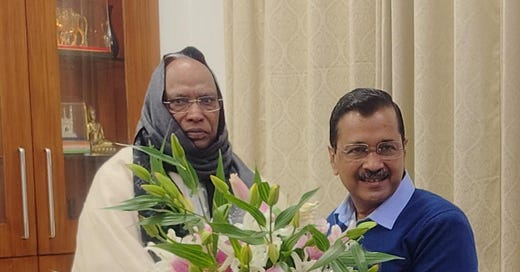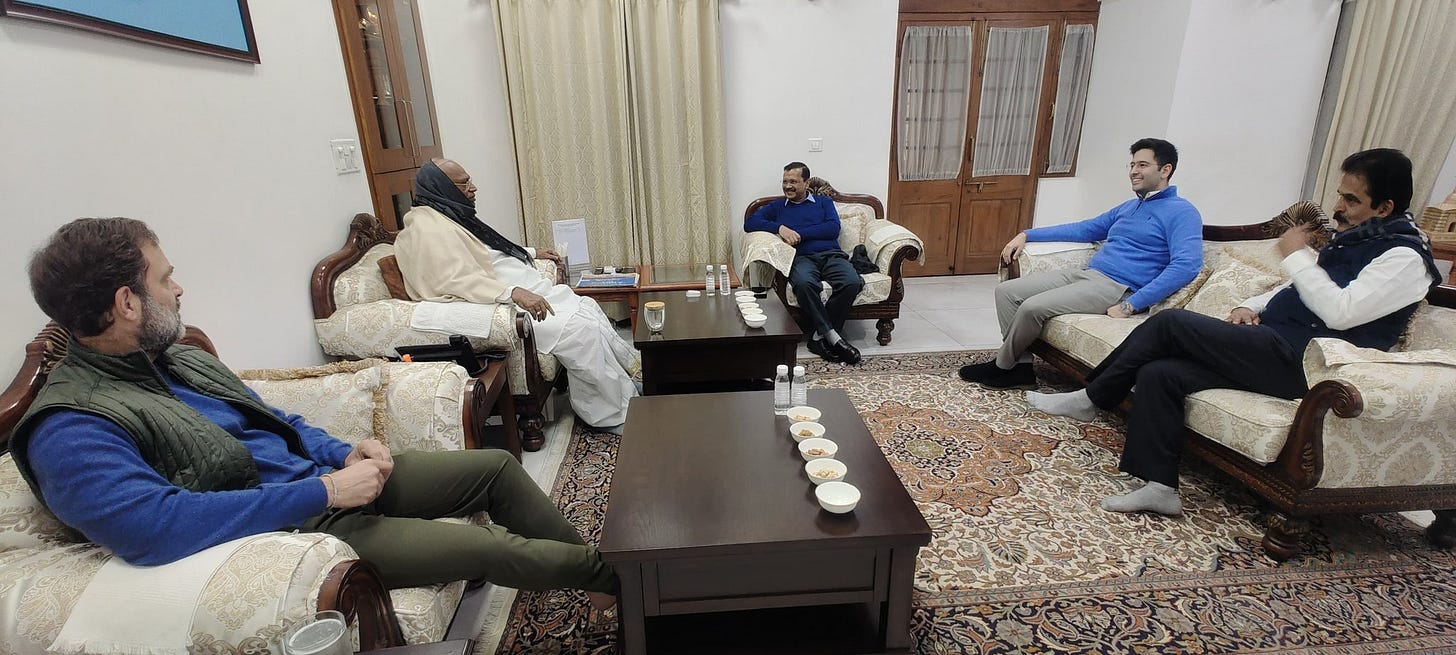Arvind Kejriwal Faces Fourth ED Summons: Implications of Non-Compliance
Are we close to a showdown or faceoff?
4th ED Summons: Implications of Non-Compliance
Arvind Kejriwal, the Chief Minister of New Delhi and National Convener of the Aam Aadmi Party (AAP), has received yet another summons from the Enforcement Directorate (ED), scheduled for January 18, 2024. This marks the fourth successive summons in an ongoing contentious legal saga. As the situation unfolds, statements on behalf of AAP leaders indicate that Mr. Kejriwal is slated to address a rally in Goa on the same day. His response to this latest summons is expected to align with his previous stance, citing prior engagements and maintaining that the summons are legally flawed.
The consequences of Mr. Kejriwal's potential non-compliance with this summons raise several questions, including the legal implications and the ED's course of action. While the specifics of the outcome remain uncertain, it is clear that this ongoing legal battle continues to draw significant attention and holds implications for both the individual involved and the broader political landscape. In the face of these developments, observers and stakeholders eagerly await Mr. Kejriwal's response and curious to learn about the potential subsequent actions that may follow, as the legal and political dynamics surrounding this case continue to evolve.
Possible Consequences
If Arvind Kejriwal, the Chief Minister of Delhi, chooses to skip the fourth successive summons by the Enforcement Directorate (ED), scheduled for January 18, 2024, there could be several consequences, particularly if he maintains his stance of prior engagements and continues to assert that the summons are bad in law. Here are the key implications:
Legal Escalation: The ED may view repeated non-compliance as defiance of their authority. This could lead to an escalation in legal actions against him, such as moving to the courts to seek enforcement of the summons through legal mandates like bailable or non-bailable warrants.
Judicial Scrutiny: Kejriwal's repeated non-compliance could potentially result in judicial intervention. His argument regarding the legality of the summons might be scrutinized in court, leading to a legal battle that could either validate his stance or rule against it. Who would approach the Court first? Too early to tell.
Political Repercussions: Continued non-compliance could be used by political opponents to question Kejriwal's willingness to cooperate with law enforcement agencies. This could have varying effects on his public image and political standing, depending on public perception and the narrative set by different stakeholders.
Public Perception: The public's perception of Kejriwal's actions will be influenced by the manner in which the situation is presented by the media, political commentators, and AAP's communication strategies. His supporters might view his non-compliance as a stand against what they perceive as misuse of power, while critics might see it as avoidance of legal scrutiny.
Potential for Arrest: While less common in high-profile cases, repeated non-compliance could technically lead to stronger measures like arrest, especially if the ED deems it necessary to ensure his appearance. However, obtaining bailable warrants from the Special PMLA Court appears to be the most likely course of action.
Impact on AAP's Activities: His engagements, such as the scheduled rally in Goa, could be impacted by the increasing legal pressure, potentially affecting the party's planned political activities.
In summary, skipping the summons could lead to a complex interplay of legal, political, and public opinion challenges, each carrying its own set of ramifications for Kejriwal and the AAP. The course of action he chooses will likely be influenced by a combination of legal counsel, political strategy, and the broader implications of his decisions within the context of his role as a public figure and party leader.
Can ED arrest without warrant in this case?
Under the Prevention of Money Laundering Act (PMLA), 2002, the Enforcement Directorate (ED) does have the authority to arrest an individual without a warrant in certain circumstances. This power is articulated in Section 19 of the PMLA.
Section 19 of the PMLA, 2002: Power of Arrest
Authority to Arrest Without Warrant: Section 19 authorizes the ED to arrest any person if the authority, based on the information and material in their possession, has reason to believe (the belief being recorded in writing) that the person has been guilty of an offense punishable under Section 4 of the PMLA.
Offense under Section 4: Section 4 deals with the punishment for money laundering, which includes rigorous imprisonment and fines.
Reason to Believe: The term "reason to believe" signifies that the decision to arrest must be based on credible information or material, and not just suspicion. The recording of this belief in writing is a safeguard to ensure accountability and transparency in the decision-making process.
No Need for Warrant: This provision allows the ED to bypass the standard requirement of obtaining an arrest warrant from a court, enabling prompt action in cases where delaying the arrest might impede the investigation or where the individual poses a flight risk.
Implications for High-Profile Cases:
Exercise of Power: In high-profile cases, such as those involving political figures or public personalities, the decision to arrest without a warrant can be contentious and is often made with considerable deliberation, given the potential for public and media scrutiny. As stated before, obtaining a warrant from the Special Court could be the most likely next step for ED.
Legal Challenges: Any such arrest is subject to legal review, and the arrested individual has the right to challenge the arrest in court. The ED must be able to justify its "reason to believe" with substantial evidence. Checking the validity of the arrest on procedural grounds— and getting it declared illegal— is often deployed in PMLA cases, since the provisions of regulars bail are very stringent.
In Summary
In the context of Arvind Kejriwal's situation, if the ED believes, with substantial evidence, that Kejriwal has been involved in money laundering activities as defined under Section 4 of the PMLA, and records this belief in writing, they could technically arrest him without a warrant under Section 19. However, such actions are typically taken with caution, especially in sensitive or high-profile cases, due to the legal and public ramifications involved.
Arvind Kejriwal is not named in the CBI RC/ FIR— much less in any CBI chargesheet. In absence of any allegation of predicate scheduled offence, how can ED summon or arrest Kejriwal?
The scenario where Mr Arvind Kejriwal is neither named in a CBI First Information Report (FIR) nor in a CBI charge sheet, yet is summoned or potentially arrested by the Enforcement Directorate (ED), raises important questions about the scope and application of the Prevention of Money Laundering Act (PMLA), 2002.
Understanding Predicate Offenses and PMLA:
Predicate Offense Requirement: Under PMLA, a money laundering charge typically requires the existence of a predicate offense, which refers to the initial crime that generated the illicit funds. Predicate offenses are listed in the schedule of the PMLA.
Independent Investigation by ED: However, the ED has the authority to conduct independent investigations even if a person is not named in the predicate offense (like a CBI FIR or charge sheet). The ED's investigation focuses on the aspect of money laundering, which can be independent of the original crime that generated the illegal proceeds.
ED's Jurisdiction: The ED can investigate any individual if they believe that the person has directly or indirectly attempted to indulge or knowingly assisted in the process of money laundering, regardless of whether they are named in the initial FIR or charge sheet of the predicate offense.
Specific Case of Mr Arvind Kejriwal:
In Mr Kejriwal's case:
If the ED believes, based on its investigation and evidence, that there is a money laundering angle involving him, they can summon him for questioning.
This action can be justified even if he is not named in the original FIR or charge sheet related to the predicate offense.
The ED's investigation focuses on the laundering aspect, which is the handling or processing of the proceeds of the predicate offense.
Legal Scrutiny and Safeguards:
Judicial Review: Any action taken by the ED, including summoning or arresting someone not named in the predicate offense FIR or charge sheet, is subject to judicial review and must be backed by sufficient evidence and reasoning.
Rights of the Summoned/Accused: The person summoned or arrested has the right to challenge the ED's action in court, ensuring that there are checks and balances on the agency's powers.
In summary, while the ED's actions must be based on concrete evidence and within the ambit of the law, the absence of a person’s name in the predicate offense FIR or charge sheet does not automatically preclude the ED from investigating or taking action against them if they find substantial grounds in the context of money laundering.
Can the Enforcement Directorate (ED) proceed against Arvind Kejriwal by invoking the offence of conspiracy under Section 120-B of the Indian Penal Code (IPC), even if there is no evident money trail linking him to the receipt of "proceeds of crime"? This would be in the context of alleged conspiracy to commit scheduled offences, such as those under the Prevention of Corruption Act, attributed to his former cabinet colleagues.
While one can provide general information, it's important to note that legal interpretations can vary, and the specifics of each case can influence the outcome. In general, invoking the offense of conspiracy under Section 120-B of the Indian Penal Code (IPC) can be used by law enforcement agencies like the Enforcement Directorate (ED) to pursue charges even in cases where there may not be a direct link to the "proceeds of crime" under the Prevention of Money Laundering Act (PMLA), 2002.
Here are some key points to consider:
Conspiracy Offense: Section 120-B of the Indian Penal Code (IPC) pertains to the crime of criminal conspiracy, a broad provision that applies when two or more individuals conspire to commit an offense, regardless of the specific law involved. Notably, conspiracy can involve mere agreement to commit an offense; there is no requirement for overt actions, preparation, or actual attempts towards its commission. Legal experts emphasize that alleging conspiracy is relatively straightforward, but proving it can be exceptionally challenging. Agencies like the Central Bureau of Investigation (CBI) and the Enforcement Directorate (ED) often leverage the potential for witnesses to become approvers, offering them pardon in exchange for valuable information and evidence.
Predicate Offense: In cases related to money laundering, as per the PMLA, a "predicate offense" is typically required. This means there should be an underlying crime (e.g., corruption, fraud, drug trafficking) that generated the illegal proceeds. The ED investigates the money laundering aspect, which is linked to the predicate offense.
Expanding the Investigation: If the ED believes that a person has conspired to commit a scheduled offense (such as those under the Prevention of Corruption Act) and there is evidence to support this, they can pursue charges of conspiracy. This allows the ED to widen its investigation beyond the money laundering aspect and delve into the underlying offenses.
Evidence and Legal Scrutiny: Any action taken by the ED, including invoking Section 120-B IPC, must be supported by concrete evidence. Legal proceedings provide an opportunity for the accused to challenge the charges and for the court to assess the evidence.
Dual Prosecution: It's important to note that a person can be prosecuted for both money laundering (under PMLA) and conspiracy (under IPC) simultaneously if there is sufficient evidence to support both charges.
In summary, while the absence of a direct link to "proceeds of crime" may limit the ED's money laundering case, they can still invoke conspiracy charges under Section 120-B IPC if there is evidence of conspiracy to commit other scheduled offenses. Legal proceedings will ultimately determine the validity of these charges and the evidence presented.
Summarizing and Looking Ahead
While it is crucial to uphold the due process of law, it's evident that the respective interpretations of the law in this case are polar opposites. Such legal disputes can only be definitively resolved by the constitutional courts. In this context, it's noteworthy that a 7-Judge Constitutional bench of the Supreme Court of India is scheduled to commence hearing on the constitutional validity of various laws, including the PMLA, 2002, starting from January 30, 2024, essentially on the ground that these ought not to have been passed as a Money Bills. Although these matters may not be decided in a matter of weeks, the current apparent stalemate or logjam regarding the compliance of ED's summons by Arvind Kejriwal may need resolution before that, unless there is specific intervention by the 7-Judge bench. It is, however, crucial to understand that the precedent that ED or the constitutional courts set in the case of Mr. Arvind Kejriwal shall have far-reaching ramifications in other similarly placed ED cases all over the country, shaping the legal landscape for such matters.






